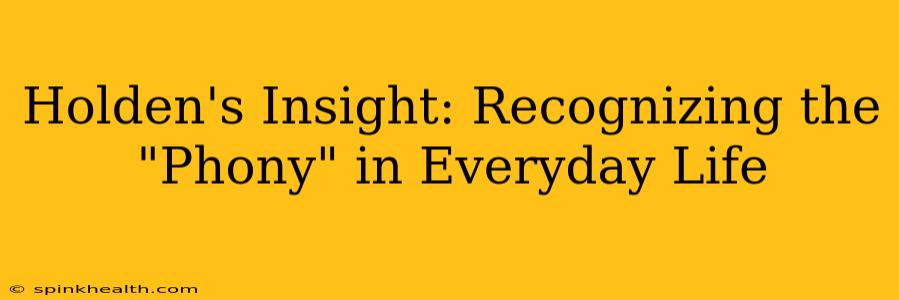J.D. Salinger's The Catcher in the Rye isn't just a coming-of-age story; it's a poignant exploration of authenticity in a world perceived as overwhelmingly "phony" by its teenage protagonist, Holden Caulfield. Holden's cynical lens, while often frustrating, offers a powerful critique of societal pretension and the search for genuine connection. This essay will delve into Holden's definition of "phony," exploring its relevance in our modern lives and examining the enduring power of his insightful, if somewhat jaded, perspective.
What Does Holden Mean by "Phony"?
Holden's use of "phony" isn't simply about dishonesty. It's a much broader indictment encompassing superficiality, insincerity, and a lack of genuine emotional depth. He sees "phoniness" in the adults around him—the self-absorbed teachers, the manipulative businessmen, the social climbers—but also in the perceived shallowness of his peers. For Holden, "phony" describes those who prioritize appearances and social conformity over genuine human connection and personal integrity. He despises the performance of roles, the forced smiles, and the empty gestures that mask a lack of genuine feeling.
How Does Holden Identify "Phonies"?
Holden's judgment is often harsh and unforgiving. He identifies "phonies" through a combination of keen observation and intuitive emotional intelligence. He picks up on inconsistencies between words and actions, detecting the subtle cues of insincerity. He's particularly sensitive to hypocrisy, recognizing the gap between professed values and actual behavior. His disgust with the adults who preach morality while engaging in questionable actions fuels his cynicism. He often observes their superficial interactions, noticing the lack of genuine empathy and the prevalence of self-serving motives. For example, his interactions with his former teachers highlight his perception of their intellectual dishonesty and lack of genuine care for their students.
What are some examples of "phoniness" in Holden's world?
Holden encounters "phoniness" in various forms throughout the novel. He finds it in the superficial social interactions at parties, the pretentiousness of his classmates, and the hypocrisy of adults who preach morality yet fail to live up to their own standards. He is particularly critical of those who seem to be acting a part rather than being themselves. This includes the actors he observes, the adults he interacts with, and even some of his peers. His criticism isn't just about lying; it's about a pervasive lack of genuine emotion and connection.
Is Holden himself a "phony"?
This is a complex question central to the novel's enduring appeal. While Holden vehemently criticizes "phoniness," he displays behaviors that could be interpreted as such. His cynicism, his alienation, and his occasional manipulative actions complicate his moral stance. He is undeniably flawed and inconsistent, making him a more relatable and ultimately more human character. His self-awareness, however, hints at an underlying desire for authenticity, even if he struggles to achieve it.
How can we apply Holden's insights to our modern lives?
Holden's critique, while rooted in a specific time and place, resonates deeply with contemporary concerns about authenticity and connection in an increasingly digital and superficial world. His observations about social media's potential for manufactured identities and performative displays of happiness still hold relevance today. His skepticism towards societal pressures to conform can encourage a critical examination of our own lives and values. We can learn from Holden's discerning eye and his commitment to seeking genuine human connection, even if that means facing discomfort and embracing vulnerability. By recognizing and challenging "phoniness" in our own lives, we can strive for a more authentic and meaningful existence.
How does Holden's concept of "phony" differ from other concepts of dishonesty?
Holden's definition of "phony" goes beyond simple lies or deception. It encompasses a deeper sense of artificiality, a lack of genuine emotional depth, and a disconnect between words and actions. Unlike simple dishonesty, "phoniness" for Holden represents a fundamental lack of integrity, a performance of a self that doesn't truly exist. This distinction highlights the nuanced and complex nature of his critique of society.
In conclusion, Holden Caulfield's insightful, if sometimes harsh, judgment of "phoniness" remains strikingly relevant in the 21st century. His perspective prompts a crucial examination of authenticity and genuine connection in a world often characterized by superficiality and performative displays. By understanding Holden's critique, we can begin to cultivate more meaningful relationships and live more authentic lives, embracing vulnerability and rejecting the pressure to conform to unrealistic societal expectations.

